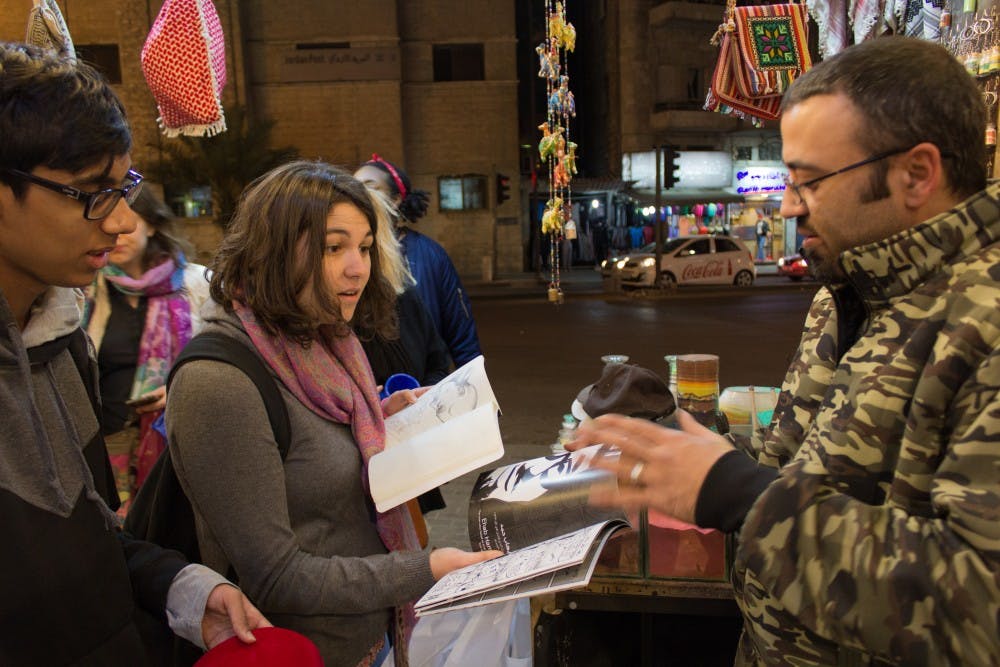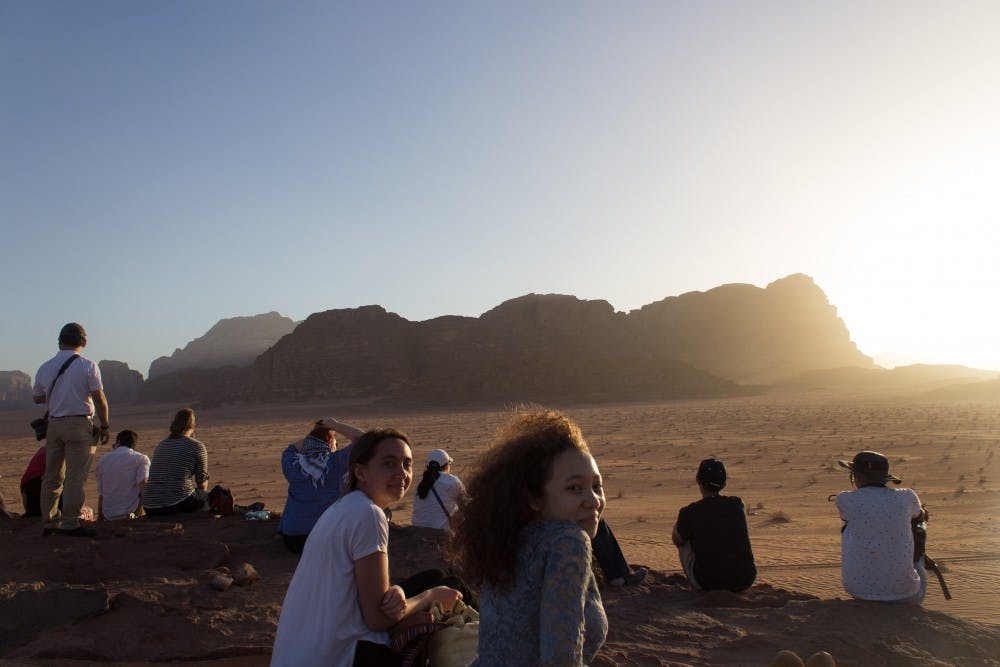
College students Vicky Samara and Damon Duchenne speaking with a Palestinian comic book artist on a Penn Global trip in Amman, Jordan.
Credit: Kos ManteWith Advanced Registration under way, Penn students find themselves sifting through new course offerings to plan for the upcoming school year. And with the expansion of Penn Global Seminars, many may find themselves abroad during school breaks.
According to the Penn Global website, Penn Global Seminars are semester-long courses that include a travel component during the winter, spring, or summer break and that seek to “deepen” and “contextualize” course content.
For the 2018-2019 academic year, Penn Global is offering 12 Global Seminars, three more than this year, and seven more than the 2016-2017 academic year, when it was conceived.
The most significant expansion to the upcoming school year involves the incorporation of two first-year writing seminars: “The City of Delhi: New, Old, and Unmapped” and “South Africa Rising: Past and Present in the New South Africa.”
The goal of Penn Global Seminars is to provide “greater access” to Penn students by increasing the number of students that can participate and the variety of locations offered, according to Penn Abroad Director Nigel Cossar.

College students Caitlin Muldowney (left) and Arianna Hill watching the sunset in the Wadi Rum desert.
He added that the definition of "access" is multi-faceted, as it provides access to students with time or financial restraint, while also offering study abroad opportunities in fields that don’t traditionally offer them, and to places that Penn students don’t traditionally travel.
While many semester-abroad programs take place in Western Europe, next year’s Global Seminars will take students to Uganda, Iceland, Ghana, South Africa, Jamaica, and the Czech Republic.
The changes come as part of a continual expansion. While the original Global Seminars included an Engineering course, this year saw an expansion of Penn Global Seminars to include fields outside of the humanities, such as Nursing, Legal Studies, Earth and Environmental Science, linguistics, and Operations, Information and Decisions.
Professor Sara Byala, who will be teaching the writing seminar traveling to South Africa in the spring of 2019, said that traveling to a place “makes perfect sense after a semester of digging into a topic.” While work for a writing seminar may not always be "easy or fun," Byala said students will appreciate the content knowledge they will develop when seeing the subject in real life.
Professor Fayyaz Vellani, who will be teaching the other new writing seminar traveling to Delhi, said that, as a geographer, “actually going to the place adds another level of understanding and experience to how you study that place.”
Unlike most courses, Penn Global Seminars require an application that includes both a written portion and an interview. For courses with high demand, there may be a waitlist.
This semester’s Global Seminar offerings included “Sufis and Gods: Temples and Shrines of Southeast Asia,” a religious studies course that traveled to Singapore and Malaysia. Among the students traveling were College junior Shiv Nadkarni and College sophomore Gabe Brodsky.
Brodsky said he was encouraged to take the course by a professor. “It really struck my interest because I’ve always been hesitant to leave Penn for a whole semester,” he added.
Shiv added that global seminars are a unique Penn experience as opposed to other study abroad options because students get to experience people and places outside their course of study. Because students of a variety of disciplines converge to take a seminar, Shiv said, “it forces students to keep an open mind in discussions with their peers and even allows us to open our social circles to bring unexpected friends into the fold."
Shiv described the seminar as “amazing” because of how it enriched the course material.
“It’s easy to forget a timeline of building an architectural masterpiece like the Batu Caves written on paper, but a lot harder to forget physically climbing the stairs … and standing under the grandeur of the temple itself,” he said.
The Daily Pennsylvanian is an independent, student-run newspaper. Please consider making a donation to support the coverage that shapes the University. Your generosity ensures a future of strong journalism at Penn.
Donate







